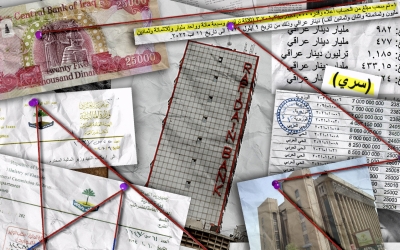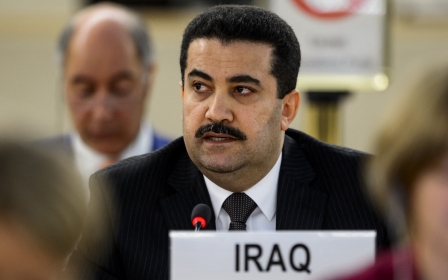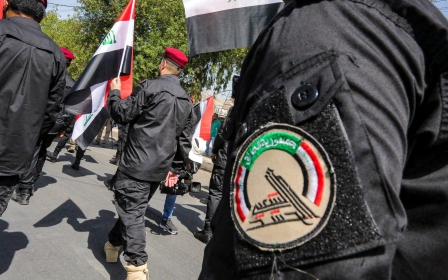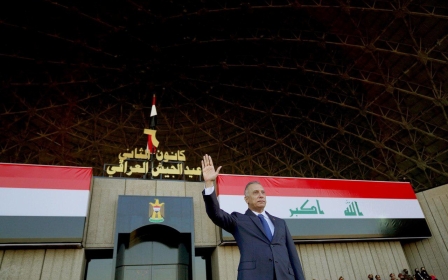Iraq: Sudani shakes up intelligence and security services in political power move

Iraqi Prime Minister Mohammed Shia al-Sudani has announced a major shakeup of the country’s security and intelligence services, appointing an influential spymaster ostracised by his predecessor as the head of national security.
Officials in Baghdad told Middle East Eye that the changes unveiled on Wednesday were intended to consolidate Sudani’s grip on power and to exclude a number of officials and employees suspected of involvement in corruption under the previous government.
One of the main – and most prominent - beneficiaries of the reshuffle is Abdul Karim Abd Fadhil, also known as Abu Ali al-Basri, who was named by Sudani to lead the Iraqi National Security Service (INSS).
Basri replaces Hamid al-Shatri, who was appointed by Sudani’s predecessor as prime minister, Mustafa al-Kadhimi.
Basri is the former head of the Falcon Cell, an elite and secretive intelligence unit, and has been nicknamed “the master of spies” by former colleagues.
New MEE newsletter: Jerusalem Dispatch
Sign up to get the latest insights and analysis on Israel-Palestine, alongside Turkey Unpacked and other MEE newsletters
He was dismissed from that role in January 2021 by Kadhimi on charges of “dealing with foreign intelligence”.
Basri denied those charges in comments to MEE at the time. Sources within the Ministerial Council for National Security told MEE then that he had been excluded by Kadhimi because of his closeness to the leaders of Iranian-backed armed factions.
'Most of the appointees are either close to Maliki, Halbousi, or the prime minister. No one in Iraq is named to occupy these positions solely for his competence'
- senior INSS official
In a statement announcing the new appointments, Major General Yahya Rasool, Sudani’s spokesperson, said: “This step [was taken] after an extensive study to enhance security and stability in various regions of the country and for the requirements of the public interest."
The shakeup "aims to inject new blood and give an opportunity to other leaders to manage the security file to raise the efficiency of the security institutions' performance," Rasool added.
But the return of Basri, and other senior appointments, suggest additional factors are also in play, according to MEE’s sources.
In addition to Basri, changes within the INSS included the appointment of new security and administrative directors, and new director generals of the Baghdad security department and governorates security department.
In another prominent appointment, Sudani named Waqqas Muhammad Hussein al-Hadithi as deputy head of the Iraqi National Intelligence Service (INIS). Hadithi is considered to be an associate of the parliamentary speaker, Muhammad al-Halbousi, sources told MEE.
Another senior appointee, Ali Shamran Khazal, the new director general of the INSS’s Governorates Security Department, is seen as an ally of former prime minister Nouri al-Maliki, sources said.
'Partisan quotas'
Both appointments appear in line with the requirements of Iraq’s power-sharing political system, in which positions in state departments, ministries, and independent bodies are shared between parties based on the number of parliamentary seats they hold - unless they choose to go into opposition.
Security officials told MEE that most of the appointees were chosen on the basis of "partisan quotas".
"Some of those assigned are qualified and have been promoted. This cannot be denied, but the selection of all was subject to political quotas," a senior INSS official told MEE.
“Most of the appointees are either close to Maliki, Halbousi, or the prime minister. No one in Iraq is named to occupy these positions solely for his competence or for career progression.”
On the other hand, one of the most prominent figures removed from his role is Majid Ali Hussein, the former deputy head of the intelligence service who was moved to the National Security Advisory, a body that advises the Ministerial Council for National Security and coordinates national security policies.
Hussein, like Shatri and some others removed from their positions, had been appointed under Kadhimi.
The sweeping security and intelligence shakeup was preceded by administrative changes affecting several high-ranking officials in independent public bodies.
On Tuesday, Sudani issued an order to remove Rafel Yassin as head of the Federal Board of Supreme Audit (FBSA), Iraq’s public spending watchdog. Yassin was replaced by Ammar Subhi al-Mashhadani.
No reason was given for Yassin’s dismissal.
Last year, the FBSA came under scrutiny over the so-called "theft of the century" plot, in which billions of dollars in tax deposit funds were stolen via dozens of fake cheques cashed by a state-owned bank.
According to a report by the Iraqi finance ministry seen by MEE, the thefts occurred after the FBSA had been removed from a key role in auditing tax refund requests.
Sources familiar with the investigations told MEE that Yassin is suspected of involvement in that theft.
Yassin has not commented on the matter. MEE contacted the FBSA after details of the plot were exposed, but sources told MEE that no one would comment while investigations were ongoing.
Yassin’s replacement by Mashhadani fits with the pattern of appointments according to political quotas, because Yassin is associated with Maliki while Mashhadani is allied to Halbousi.
Replaced or dismissed
One of Sudani’s advisors confirmed to MEE that most of the changes are politically motivated, but said that some are punitive.
“Some of the changes aim to achieve political balance, and they are part of the political agreements that produced the current government," the advisor said, speaking on condition of anonymity.
“Some are punitively motivated. As long as we cannot hold some of the senior officials accountable because of their political affiliations, then at least we will get rid of them."
'The biggest challenge Sudani faces is how to dismantle the deep state'
- advisor to prime minister
Sudani's allies and critics agree that he is in the process of building his own governmental power base.
To his supporters, he has worked shrewdly and quietly, taking advantage of circumstances and opportunities as they arise to strengthen his control over various ministries and departments without arousing the wrath of his partners or opponents.
"The biggest challenge Sudani faces is how to dismantle the deep state. We have thousands of senior officials and officers who are associated with political parties. This is a serious problem that we have been dealing with calmly,” the advisor said.
“Hundreds of directors, deputy ministers, and security commanders have to be replaced or dismissed, either for their incompetence or for their involvement in corruption cases.
“[There are] those that are well protected by their political and armed factions associations, and this is what we call the deep state.
“This state has to be undermined. This is what Sudani has been doing for a while, and it will last for a while to come.”
Middle East Eye delivers independent and unrivalled coverage and analysis of the Middle East, North Africa and beyond. To learn more about republishing this content and the associated fees, please fill out this form. More about MEE can be found here.





